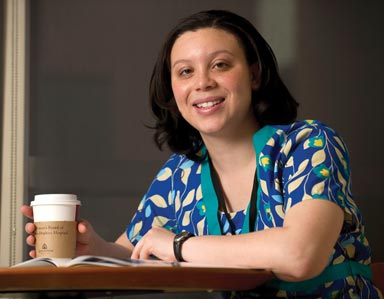Oncology nurses need to care for themselves, too
By Sarah Achenbach

Caregiver. Cheerleader. Confidant. Sharon Krumm, PhD, RN, knows well how all-encompassing the job of oncology nurse can be. “We care for patients over a period of time and develop wonderful relationships with them and their families.” says Krumm, the director of nursing administration for the Sidney Kimmel Comprehensive Cancer Center at Johns Hopkins. A close bond between nurse and cancer patient is critical to treatment and essential to any end-of-life issues a patient might face. “As horrible as the disease and treatment can be, it is especially rewarding when you can contribute to a ‘good death’ for the patient and family,” she notes.
Such necessary closeness, though, exacts an emotional toll. “We listen to their entire life, and we’re with them at possibly the end of their life,” says MySha Allen, RN, Weinberg 5A. “We share in their most vulnerable moments. But we feel we need to be this pillar of strength.”
The intensity of the work and its inherent stress and sadness—and an unspoken professional code not to express grief—weigh heavy on nurses both personally and professionally. In her 30-plus year career in oncology, Krumm has watched nurse after nurse burn out. “Often, there’s no time for nurses to grieve the loss of a patient,” she says. “In our culture, a ‘good’ nurse never asks another nurse to care for patients or leaves the unit. So much of it is the professional identity nurses cloak themselves in, but we need to take time and process.”
Five years ago, Krumm embarked on a study to find ways to reduce nurses’ stress and quell her profession’s high burn-out rate. Oncology nurses and ICU have the highest turnover rates among all nurses; in fact, as her study was beginning, Hopkins oncology nurses experienced a 30.9% turnover rate compared to a 13.3% turnover rate for all other Hopkins nurses. Today, through a $367,500 grant from the MarylandÕs Health Services Cost Review Committee, the Professional Bereavement & Resiliency Project is helping to transform the field of oncology nursing at Hopkins.
Krumm first gathered 34 pediatric, gynecological, and adult oncology nurses into focus groups to identify the stressors that made resiliency more challenging. Krumm was hardly surprised by the answers.
“Nurses said that the pressures of work didn’t give them space to attend to personal grief,” she explains. Suggestions ranged from the practical—getting off the unit for a meal break and consistent scheduling—to the personal, such as attending memorial services and sending cards to a patient’s family. The most validating response for Krumm was her colleagues’ number one suggestion: create a palliative care program for patients. (In 2007, the Department of Oncology created its formal Palliative Care Program.)
Krumm kicked off the program in 2008 in an unexpected way: she invited the nurses to play.
Performance of a Lifetime (POAL), a New York-based theater training and consulting company, led 248 oncology nurses in a mandatory session of improvisation and performance. With a goal of individual and collective growth, the open-ended session focused on staff interactions. The exercises helped people feel more confident to tackle hard conversations and deal with petty frustrations.
“It was unlike anything I’ve ever seen, but it moved people out of their comfort zone and gave them a safe place to take risks,” remarks Krumm.
The POAL program helped Weinberg 5B nurse Michelle Morgan discover how to better manage the stress so prevalent in her job: “The coaches helped me learn new ways to react to situations I face and to ‘rewrite’ my script, to change the way I normally express myself.” Throughout 2009, 60 percent of the oncology nurses participated in subsequent, voluntary coaching sessions for which they set the agenda and determined topics.
The Professional Bereavement & Resiliency Project has addressed work issues such as reducing shift rotations and encouraging every nurse take a meal break off the unit, strategies that make it easier for nurses to find time to renew. And through an expanding “menu” of options offered by different units—regular massage therapy sessions, journaling classes, mindfulness training, unit retreats, and Chi Gong, to name a few—nurses can boost their resiliency skills and relax.
“I honestly believe it’s changing the culture,” she says. “We’re building community and improving how we work together. We’re at 99% occupancy on my unit, yet when I make rounds, I see smiles. Most often, it has been the nurses’ support of one another that has proven most beneficial.”
For a field that deeply supports a cancer patient’s need to be emotionally vulnerable, perhaps the most transformative aspect of the project is the recognition it has given to the nurse’s emotions.
“This program has made a richer, more open environment,” reflects Allen. “By being vulnerable, you realize how human you are. One day, we may be that person in the bed, and we would want the person standing over us to be just as vulnerable.”